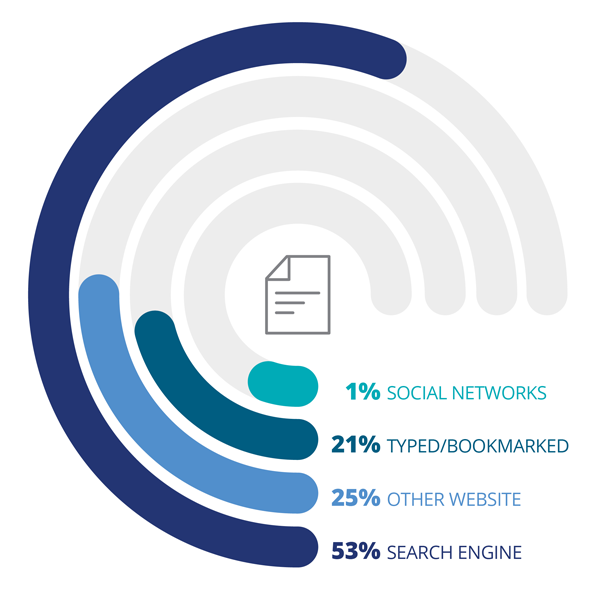
In today’s digital age, having a strong online presence is crucial for any business or individual looking to make an impact. Search Engine Optimization (SEO) is the key to enhancing your website’s visibility and driving organic traffic. SEO is the process of optimizing your website to rank higher on search engine results pages (SERPs). The higher your site ranks, the more likely it is to attract visitors. SEO involves various techniques, including keyword research, on-page optimization, technical SEO, and off-page SEO.
Keyword research is the starting point for any successful SEO strategy. It involves identifying the words and phrases your target audience uses when searching for products or services related to your business. Tools like Google Keyword Planner, Ahrefs, and SEMrush can help you find relevant keywords with high search volumes and low competition. To identify your niche, understand your target audience and the specific terms they use. Focus on long-tail keywords as they often have lower competition and higher conversion rates. Analyze your competitors to see what keywords they are ranking for and identify gaps you can fill.
On-page SEO refers to the practices you implement directly on your website to improve its ranking. This includes optimizing your content, meta tags, and images. Ensure your title tags are compelling and contain your primary keywords. Meta descriptions should provide a brief, engaging summary of your page content. Use header tags (H1, H2, H3) to structure your content, making it easier for search engines to understand. Include relevant keywords in these tags. Create high-quality, informative, and engaging content that addresses the needs of your audience. Use keywords naturally and avoid keyword stuffing. Link to other relevant pages on your site to improve navigation and help search engines crawl your site more effectively. Use descriptive file names and alt tags for your images and compress images to reduce loading times.
Technical SEO focuses on the backend aspects of your website that affect its performance and user experience. Ensure your website is responsive and performs well on mobile devices. Google uses mobile-first indexing, so a mobile-friendly site is crucial. Optimize your site’s loading speed by compressing images, leveraging browser caching, and using a content delivery network (CDN). Use HTTPS to secure your website, which can also positively impact your rankings. Create and submit an XML sitemap to search engines to help them understand your site structure and index your pages. Use a robots.txt file to guide search engine crawlers on which pages to index.
Off-page SEO involves activities outside your website that can impact your rankings. The primary focus is on building backlinks, which are links from other websites to your site. Seek backlinks from authoritative and relevant websites. Quality is more important than quantity. Write guest posts for reputable blogs in your industry to gain exposure and build backlinks. Promote your content on social media platforms to increase its reach and attract backlinks. Ensure your business is listed in relevant online directories and review sites.
Monitoring and Analyzing Your SEO Efforts
Continuous monitoring and analysis are vital to the success of your SEO strategy. Use tools like Google Analytics and Google Search Console to track your performance. Monitor your keyword rankings and see how they change over time. Look at your organic traffic and identify trends or patterns. Use these tools to identify any technical issues or penalties affecting your site. Based on your analysis, adjust your SEO strategies to improve performance.
Keeping Up with SEO Trends and Algorithm Changes
SEO is not a static field; it evolves constantly as search engines update their algorithms and user behaviors shift. Staying current with these changes is crucial for maintaining and improving your search rankings. Follow industry blogs, attend SEO conferences, and participate in webinars to stay informed about the latest trends and best practices. Google often announces major updates, so keeping an eye on these can give you an edge in adjusting your strategies promptly.
User Experience (UX) and SEO
User experience is becoming increasingly important in SEO. Search engines aim to provide the best possible results for their users, which means they favor websites that offer a seamless and enjoyable experience. Ensure your site is easy to navigate, with a clean design and intuitive interface. Pay attention to page load times, mobile responsiveness, and clear calls to action. The longer visitors stay on your site and engage with your content, the better it signals to search engines that your site is valuable and relevant.
Local SEO for Small Businesses
If you operate a local business, optimizing for local search is essential. Local SEO focuses on making your business visible in local search results, which is particularly important for attracting customers in your area. Ensure your business information is accurate and consistent across all online directories, including your name, address, and phone number (NAP). Encourage satisfied customers to leave positive reviews on platforms like Google My Business and Yelp. Local backlinks and locally relevant content can also boost your local SEO efforts.
Content is Still King

While technical aspects of SEO are critical, content remains at the heart of SEO. High-quality, relevant, and original content not only engages your audience but also attracts backlinks and improves your site’s authority. Regularly update your blog with fresh content, covering topics that are relevant to your audience and industry. Use a mix of text, images, and videos to make your content more engaging. Long-form content often ranks better because it provides more comprehensive information on a topic, so aim for depth and detail in your posts.
Conclusion
Mastering SEO is a continuous process that requires dedication and a willingness to adapt to changing algorithms and trends. By implementing effective keyword research, on-page and technical optimization, and building a robust off-page presence, you can significantly enhance your website’s visibility and drive organic traffic. Stay informed about the latest SEO best practices and be proactive in refining your strategies to achieve long-term success. SEO is not a one-time task but an ongoing effort that pays off over time. Start optimizing today and watch your website climb the search engine rankings, attracting more visitors and potential customers.

